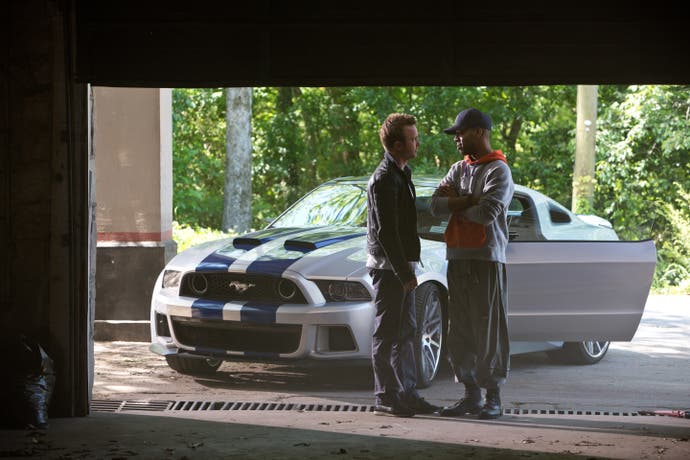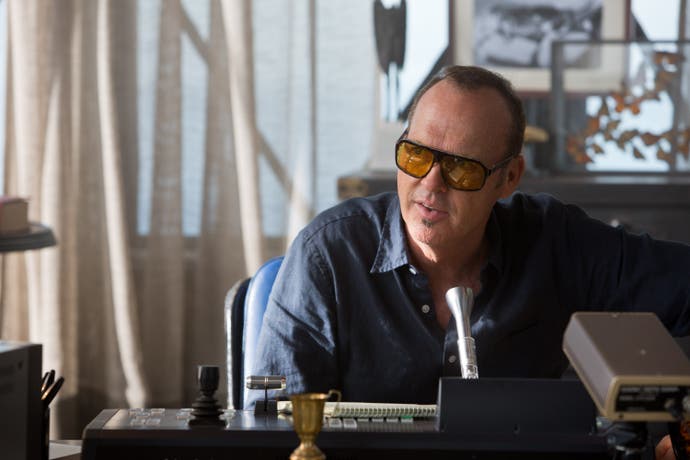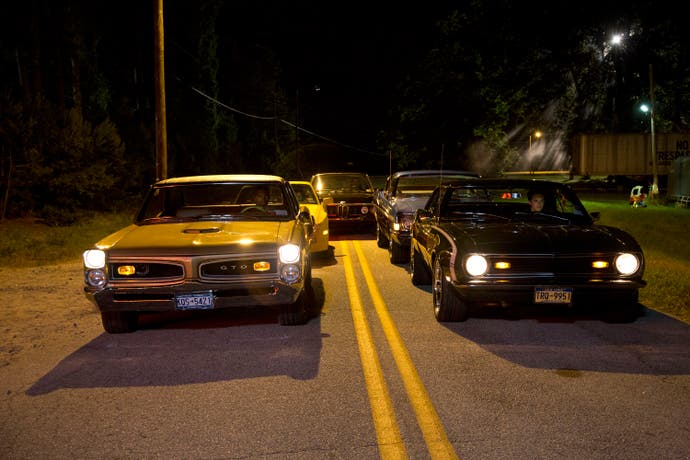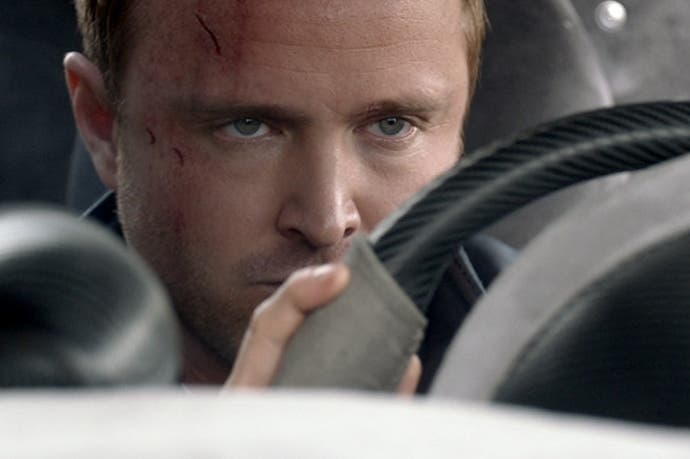Need for Speed film review
Can Hollywood do what EA couldn't, and spin a story out of street racing?
From a gamer's perspective, Need for Speed seems an odd choice for a movie. In 20 years and as many games, EA's glossy, hyper-real street-racing series has never produced a character or storyline worth a damn, although it has tried - notably in 2011's misfire The Run and the horribly gauche live-action cut-scenes of 2005's Most Wanted. At their best, the games are thrilling entertainment, but it's of a kind that has next to nothing to do with cinema.
What on earth did Dreamworks' producers see in it? Something quite simple, I reckon: a chance to use EA's evergreen brand to lever themselves into the cheap, dumb and dirty world of gearhead cinema, currently under the uncontested rule of Universal's enormously profitable and shamefully enjoyable Fast & Furious flicks. And also, significantly: a blank slate. Perhaps if they could write their own story and chisel their own lead, they wouldn't fall into the same pit of dramatic ineptitude that every previous video game adaptation had.
They have anyway. As a dramatic film, Need for Speed is exactly as silly and almost as amateurish as EA's own attempts at blacktop opera. It has a contrived plot and risible characters, leaden gags and flat melodrama, a script that is simply awful, and worst of all, it takes itself seriously. The latter and better Fast & Furious movies seem to know they are straight-up capers, but Need for Speed pictures itself as a tale of honour and redemption.

The director Scott Waugh - who made 2012's gung-ho military hit Act of Valor, which was only nominally not a Call of Duty film - has dared to namecheck such classic car movies as Duel, Bullitt and Vanishing Point. But while it might have their unsmiling mien, this film has none of their grit. It doesn't even have the grit of Smokey & the Bandit or The Cannonball Run (both made by Hal Needham, whose career trajectory from stuntman to director Waugh has followed). It takes place in a ludicrous fantasy land where characters act without consequence or logic, computers can do anything (really - anything) and a Ford Mustang can travel at 230 miles per hour without falling to pieces. It's nonsense.
And yet you still might walk out of the cinema wearing a smile that is not entirely ironic. Need for Speed is entertaining in spite of itself for a couple of reasons - and Waugh and the producers deserve all credit for sticking to these two important principles. One, it's not a digital effects bonanza; it was all shot for real, with practical stunts in real cars. Two, it keeps its foot on the gas. This isn't one of those racing movies that's all montage and build-up. I don't think you're out of a speeding car for more than 10 of its 130 minutes at a time.
Our hero is Tobey Marshall (Breaking Bad's Aaron Paul) a blue-collar mechanic and street racer from New York state. His nemesis is Dino Brewster (Fleming's Dominic Cooper), an oily, monied car dealer and racing champion. Dino pays Tobey to modify a Shelby Mustang 500 for sale, then cheats him out of the deal and lands him in jail when a wager they make on a street race ends in tragedy. Two years later, Tobey emerges from jail and immediately sets about exacting revenge and clearing his name by entering the same Mustang against his rival in the glamorous De Leon, a secret underground race for the highest of rollers - but it's in two days' time in California, and Dino has put a bounty on his head.

It's a preposterous scenario but it does what's needed: it keeps Need for Speed on the road. The film starts with a race, follows it with a race, then - en route to its climactic race - enacts the classic scenario of both Detroit and Hollywood myth: 48 hours to get from one coast to another on nothing but eight American cylinders. Screw the law and screw the rules, apart from the one that says it's compulsory to drive through Monument Valley.
"Crucially, Need for Speed understands that video game visuals are advanced enough now that there's no point faking it when adapting them"
The gaps are mostly filled with wooden hi-jinx between Tobey and his crew, who follow him on the ground and in a plane - he must be the only working-class kid in America with air support - as well as a romantic subplot involving a posh British girl in his passenger seat, played by Imogen Poots. Aaron Paul, who owns an original AC Cobra, presumably enjoyed himself shooting this movie, but his famous intensity comes off as absurd when it's applied to this dramatic chipboard. Poots fares better, mostly because she wears a permanent expression of amused incredulity at everything she is required to do or say.
However, Waugh's tin ear for dialogue is balanced by an expert eye for action. Crucially, he understands that video game visuals are advanced enough now that there's no point faking it when adapting them; games already do a nice line in crisp digital mayhem and have aped all of Hollywood's most cutting-edge effects within months. He knows that what we want is to see Need for Speed's signature jumps, drifts and ridiculous flips enacted for real. The stunts aren't too inventive but they're cogently staged, thrillingly cut and landed with conviction, backed up by the bullying roar of a histrionic sound mix. (I'm pretty sure I heard a Prius taxi emit a V8 rumble at one point, while the Mustang sounds like the voice of Beelzebub.)

The (apparently late) decision to post-convert the film to 3D hasn't done it any favours, as some shots end up looking more fake than they actually are. On the other hand, the first-person sequences shot from behind the wheel are pretty exciting. It's interesting to note that first-person camerawork, once the gimmicky preserve of ropey game adaptations like Doom, is now starting to take root in mainstream filmmaking, having featured in the gritty drama End of Watch as well as the Oscar-winning cinematography of Gravity. This must be video games' first important contribution to the grammar of film. Having taken so much from Hollywood, stylistically speaking, are games finally ready to give back?
Let's hope they don't give too much of their brazen commercialism. Like the games, the film is saturated with licensing opportunities, some of it for Need for Speed itself: virtually every screen bears a familiar black-and-yellow interface, while Tobey and his bros enjoy a game of Rivals on PS4 in one painful scene. Most of the rest is a sort of bacchanalian two-hour Ford advert - although the Mustang, having done its muscle-car duty and swallowed a continent whole, is sidelined for the final race. In its place we get a line-up of the car world's most extreme exotica, true to Need for Speed form. Koenigsegg, Bugatti, McLaren, Lamborghini: all are paraded before our eyes in day-glo colours before being hurled against cop cars and each other like a toddler's toys. After they're all written off, Aaron Paul cries a single tear. For his character's catharsis or for all that twisted metal? Who knows?
Need for Speed opens in UK cinemas today, Wednesday 12th March.

